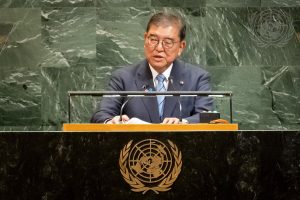In September 2025, the United Nations once again became a stage for intense diplomatic maneuvering over Palestine. While Australia, Canada, France, the United Kingdom, and others moved to recognize a Palestinian state, Japan held back. This decision underscored Tokyo’s longstanding deference to its security alliance with the United States.
Yet the new stance of three of Japan’s fellow G-7 nations compelled Tokyo to weigh recognition more seriously than ever. Prime Minister Ishiba Shigeru declared that Japan would eventually recognize a Palestinian state, warning that “Japan will be compelled to take new measures” should Israel take further steps obstructing the two-state solution. This mix of restraint and conditional firmness highlights Japan’s distinctive balancing act, carefully navigating between U.S. demands and international consensus.
Japan’s approach to the Palestinian issue has long been characterized by caution. Since the 1970s, Tokyo has maintained a careful equilibrium: steady humanitarian and economic aid to the Palestinians, principled support for a two-state solution, and continued dialogue with all parties, while refraining from formal recognition. Two core considerations underlie this posture. First, Japan prioritizes its security and economic relationship with the United States, which has opposed unilateral recognition.
Second, Japan values its credibility as a neutral mediator in the Middle East and has cultivated ties with both Arab oil producers and Israel as part of its energy and trade diplomacy. Consistent with this approach, Japan has supported Palestinian aspirations – for instance, by voting in favor of the 2012 U.N. General Assembly resolution granting Palestine non-member observer state status – while aligning with Washington on key strategic decisions.
France and Saudi Arabia co-hosted a three-day international conference on implementing the two-state solution beginning July 28, 2025. Just days before that, on July 24, France became the first G-7 nation to announce its intention to recognize the Palestinian state. The United Kingdom followed on July 29, Canada on July 30, and Australia on August 11.
These moves placed significant pressure on Japan, which has yet to recognize Palestine. While recognition is consistent with Japan’s longstanding support for a two-state solution, the United States strongly opposes such moves. U.S. Secretary of State Marco Rubio condemned France’s decision, and President Donald Trump warned that a trade agreement with Canada would become “very difficult.” For Japan – which is still finalizing tariff negotiations with Washington – this was a warning it could not ignore.
On September 3, French President Emmanuel Macron confirmed that France would co-host the U.N. conference on the Palestinian question scheduled for September 22 with Saudi Arabia. Two days after that, reports suggested that Japan would announce its position at that conference.
On September 11, a petition signed by 206 cross-party members of Japan’s National Diet calling for recognition was handed to Foreign Minister Iwaya Takeshi. Yet on September 12, reports emerged that Washington had asked Tokyo to postpone recognition, leading the government once again to prioritize U.S. demands. On September 19, Iwaya announced: “The Japanese government has decided not to recognize Palestine as a state at this time during the United Nations General Assembly session.”
Nonetheless, Iwaya articulated two points that marked a shift in Japan’s position. First, he argued the question was not “whether to recognize,” but “when to recognize.” Second, he declared that if Israel took further actions closing the path to a two-state solution, Japan would adopt “new measures,” implicitly including recognition. Such language had not appeared in previous Japanese statements and was clearly firmer toward Israel than the positions of other countries still withholding recognition.
Germany, for example, insisted recognition should come only in the final stage of negotiations, while Italy conditioned recognition on the release of all hostages by Hamas. Ishiba reiterated Japan’s new stance in his speech to the U.N. General Assembly on September 24.
Ishiba’s political orientation is shaped by his reverence for former Prime Minister Tanaka Kakuei (1972–74), whom he calls his “political mentor.” Tanaka pursued rapprochement with China and the Soviet Union and expressed solidarity with Arab oil producers during the 1973 oil crisis. Similarly, Ishiba supported Kono Taro – one of Japan’s most outspoken advocates for recognizing the Palestinian state – in the 2021 LDP presidential election. In the September 2024 presidential debate, Kono had declared, “We should recognize Palestine as a state.”
Ishiba’s political circle thus consists of figures willing to adopt independent positions, especially on Middle Eastern issues. While Ishiba refrained from recognition to avoid direct confrontation with Washington, he advanced a distinct stance: Japan will eventually recognize Palestine and may take further measures depending on Israel’s actions.
The likelihood of such measures, however, remains limited. Any unilateral step could provoke strong U.S. opposition. Still, if Washington itself sought to pressure Israel, Japan might join in opposing Israeli actions, implementing “new measures” only in coordination with the United States. For instance, Trump has stated he would not permit Israel’s annexation of the West Bank.
That said, with rising tensions in East Asia, Japan currently lacks the strategic space to risk weakening its alliance with Washington. Even if Tokyo were to recognize Palestine, it would likely proceed with extreme caution.
In October, Japan is set to see a new prime minister following the Liberal Democratic Party’s leadership election to replace Ishiba. The future course of policy remains uncertain. Koizumi Shinjiro and Hayashi Yoshimasa, both members of the Ishiba administration, are likely to maintain the current approach on recognition, while other candidates may deprioritize the issue.
Despite such uncertainties, Japan’s record suggests continuity: balancing ties with the United States while showing sensitivity to Palestinian aspirations. This careful diplomacy will continue to serve as a reference point for Japan’s future policy.





























